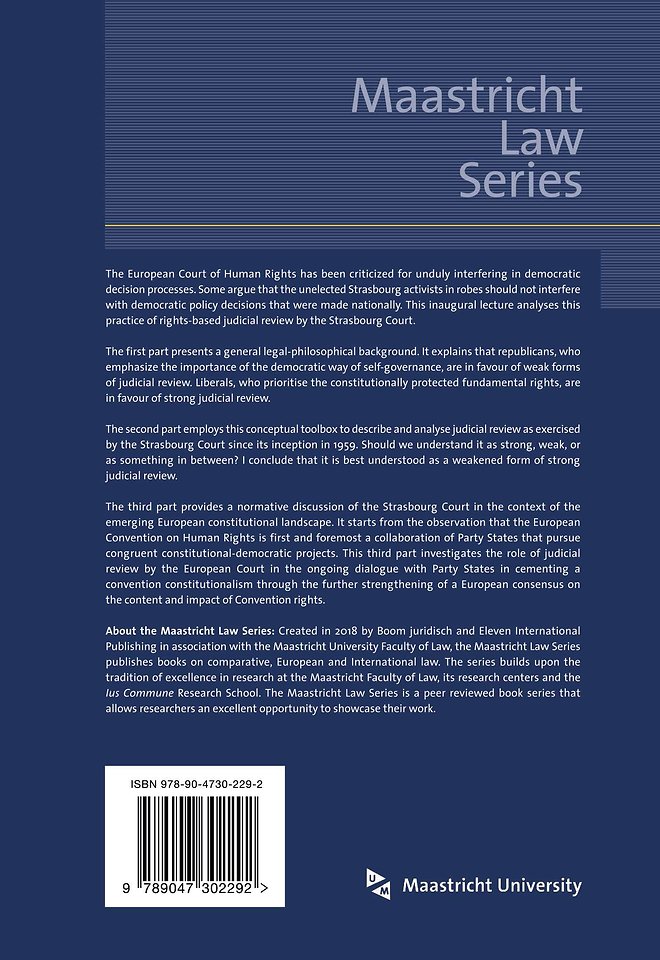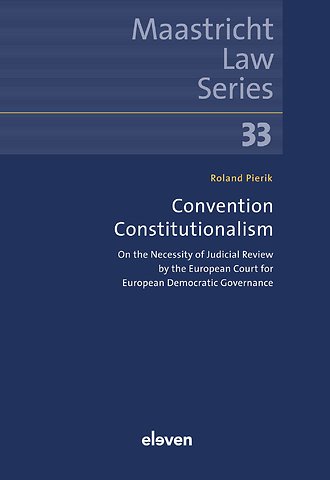Convention Constitutionalism
On the Necessity of Judicial Review by the European Court for European Democratic Governance
Paperback Engels 2024 1e druk 9789047302292Samenvatting
The European Court of Human Rights has been criticized for unduly interfering in democratic decision processes. Some argue that the unelected Strasbourg activists in robes should not interfere with democratic policy decisions that were made nationally. This inaugural lecture analyses this practice of rights-based judicial review by the Strasbourg Court.
The first part presents a general legal-philosophical background. It explains that republicans, who emphasize the importance of the democratic way of self-governance, are in favour of weak forms of judicial review. Liberals, who prioritise the constitutionally protected fundamental rights, are in favour of strong judicial review.
The second part employs this conceptual toolbox to describe and analyse judicial review as exercised by the Strasbourg Court since its inception in 1959. Should we understand it as strong, weak, or as something in between? I conclude that it is best understood as a weakened form of strong judicial review.
The third part provides a normative discussion of the Strasbourg Court in the context of the emerging European constitutional landscape. It starts from the observation that the European Convention on Human Rights is first and foremost a collaboration of Party States that pursue congruent constitutional-democratic projects. This third part investigates the role of judicial review by the European Court in the ongoing dialogue with Party States in cementing a convention constitutionalism through the further strengthening of a European consensus on the content and impact of Convention rights.
About the Maastricht Law Series: Created in 2018 by Boom juridisch and Eleven International Publishing in association with the Maastricht University Faculty of Law, the Maastricht Law Series publishes books on comparative, European and International law. The series builds upon the tradition of excellence in research at the Maastricht Faculty of Law, its research centers and the Ius Commune Research School. The Maastricht Law Series is a peer reviewed book series that allows researchers an excellent opportunity to showcase their work.
Trefwoorden
europees recht rechterlijke toetsing grondrechten constitutionalisme democratie fundamentele rechten filosofie mensenrechten democratic governance rechtfilosofie rechtsstaat europa staatsrecht rechtstheorie politiek europese integratie overheid bestuursrecht internationaal recht rechtspraak europees verdrag voor de rechten van de mens wetgeving straatsburg rechterlijke macht
Trefwoorden
Specificaties
Lezersrecensies
Inhoudsopgave
U kunt van deze inhoudsopgave een PDF downloaden
2 Legal-Philosophical Background 9
2.1 The Republican Position 9
2.2 The Liberal Position 10
2.3 Republicans and Liberals: A Conclusion 12
3 Between State Power and Competence Creep 13
3.1 The First Phase (1960-1975): the Sleeping Beauty Period 14
3.2 The Second Phase (1975-1995): the Court Finds Its Distinctive Voice 15
3.3 The Third Phase (1995-2011): the State Parties Start Grumbling 17
4 The way Forward. Should the European Court Exercise Weak or Strong Judicial Review? 19
5 Convention Constitutionalism 22
6 Conclusion 24
7 Embedment in the Law Faculty 25
8 Some Words of Thanks 26
Bibliography 27
Anderen die dit boek kochten, kochten ook
Rubrieken
- advisering
- algemeen management
- coaching en trainen
- communicatie en media
- economie
- financieel management
- inkoop en logistiek
- internet en social media
- it-management / ict
- juridisch
- leiderschap
- marketing
- mens en maatschappij
- non-profit
- ondernemen
- organisatiekunde
- personal finance
- personeelsmanagement
- persoonlijke effectiviteit
- projectmanagement
- psychologie
- reclame en verkoop
- strategisch management
- verandermanagement
- werk en loopbaan









